The SSD Anthology: Understanding SSDs and New Drives from OCZ
by Anand Lal Shimpi on March 18, 2009 12:00 AM EST- Posted in
- Storage
PCMark Vantage
Next up is PCMark Vantage, another system-wide performance suite. For those of you who aren’t familiar with PCMark Vantage, it ends up being the most real-world-like hard drive test I can come up with. It runs things like application launches, file searches, web browsing, contacts searching, video playback, photo editing and other completely mundane but real-world tasks. I’ve described the benchmark in great detail before but if you’d like to read up on what it does in particular, take a look at Futuremark’s whitepaper on the benchmark; it’s not perfect, but it’s good enough to be a member of a comprehensive storage benchmark suite. Any performance impacts here would most likely be reflected in the real world.
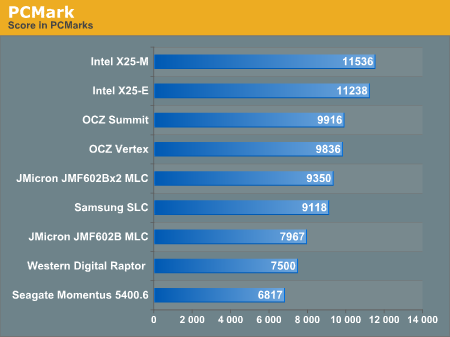
If you've paid attention to the synthetic tests from the previous pages, the results here should make sense. The Intel drives take the top two spots followed by the two OCZ drives, then the JMicron and conventional HDDs take up the rear.
While PCMark does do a great job of measuring disk performance, it doesn't seem to stress random write performance as much, allowing the JMicron drives to relax a bit.
Now let's look at the individual test suites:
The memories suite includes a test involving importing pictures into Windows Photo Gallery and editing them, a fairly benign task that easily falls into the category of being very influenced by disk performance.
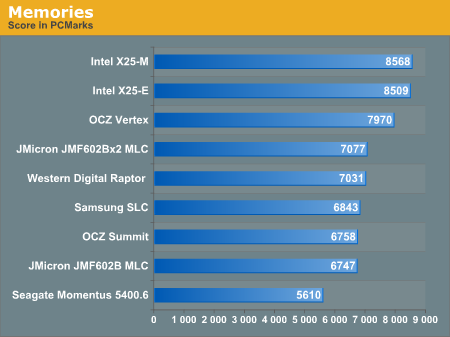
The TV and Movies tests focus on on video transcoding which is mostly CPU bound, but one of the tests involves Windows Media Center which tends to be disk bound.
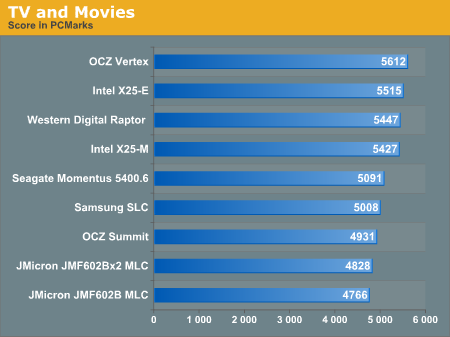
SSDs won't always dominate and in many cases they won't offer tangible improvements over a fast hard drive.
The gaming tests are very well suited to SSDs since they spend a good portion of their time focusing on reading textures and loading level data. All of the SSDs dominate here, but as you'll see later on in my gaming tests the benefits of an SSD really vary depending on the game. Take these results as a best case scenario of what can happen, not the norm.
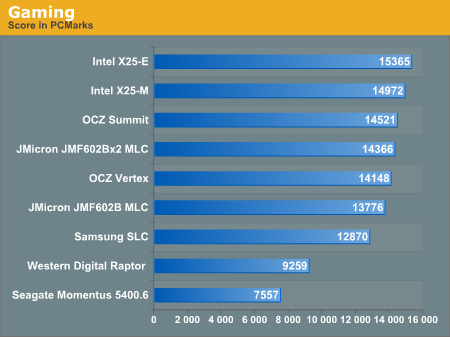
In the Music suite the main test is a multitasking scenario: the test simulates surfing the web in IE7, transcoding an audio file and adding music to Windows Media Player (the most disk intensive portion of the test).
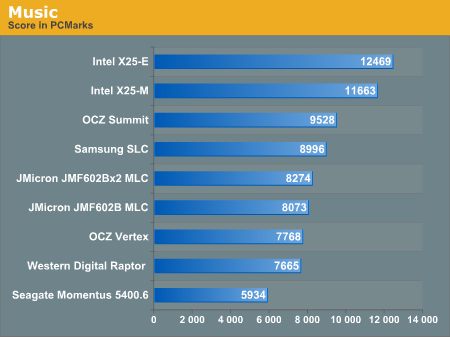
The Communications suite is made up of two tests, both involving light multitasking. The first test simulates data encryption/decryption while running message rules in Windows Mail. The second test simulates web surfing (including opening/closing tabs) in IE7, data decryption and running Windows Defender.

I love PCMark's Productivity test; in this test there are four tasks going on at once, searching through Windows contacts, searching through Windows Mail, browsing multiple webpages in IE7 and loading applications. This is as real world of a scenario as you get and it happens to be representative of one of the most frustrating HDD usage models - trying to do multiple things at once. There's nothing more annoying than trying to launch a simple application while you're doing other things in the background and have the load take seemingly forever.
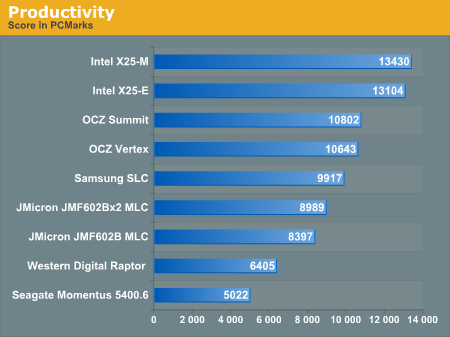
The results here are the best characterization of my personal experience with the drives. The Intel drives are the fastest, a good 25% faster than the Summit or Vertex. Next up are the OCZ drives, with the Vertex dangerously close to the Summit. The older Samsung SLC is next in the standings, followed by the JMicron drives. There's a healthy combination of reads and writes going on here which benefits all of the SSDs, including the less desirable ones.
The final PCMark Vantage suite is HDD specific and this is where you'll see the biggest differences between the drives:
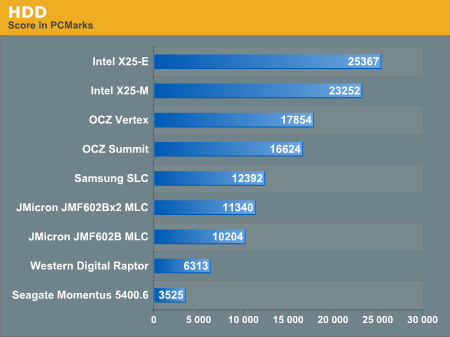
Again we're seeing the sort of breakdown we'd expect. The Intel drives come out ahead, while the Vertex is the best bang for your buck.










250 Comments
View All Comments
siberx - Thursday, March 19, 2009 - link
This is, very likely, the best article I have ever read, period. Online, in magazines, about any subject... this was an absolutely fantastic read. Suddenly, all smoke surrounding SSDs has cleared and the truth shines through in editorial brilliance. It's great to see that at least some computer news sites out there can still cut through the crap and get to the heart of the issue. My already high opinion of AnandTech has risen even further.Thank you for taking the immense time it must have taken to compile and assemble all this information - this article is now a must-read for *anybody* considering purchasing an SSD, and it's just about all the background you could need in one place.
In addition to all the extremely useful general SSD information contained within, the detailing of the issues with the JMicron controllers as well as OCZ's efforts to address the concerns to produce the best product possible (despite the reduced marketability to the uninformed) is reassuring and comforting in a world where tech companies seem more concerned with how much they can deceive their customers instead of producing quality products.
In short, the article is a win on all fronts, thank you greatly for posting it. When I purchase my first SSD (which I'm considering doing reasonably soon) this article, its information and suggestions, and OCZs actions to resolve the issues with its drives will definitely be at the forefront of my mind.
jkua - Thursday, March 19, 2009 - link
I have to say, I really appreciate the effort and throughness with which you have covered the state of the SSD market today. As an engineer and scientist, I applaud your methods in tracking down and reporting the major issues with SSDs. As a consumer, I really appreciate the timeliness of this article as I was just thinking of putting an SSD in a netbook for a robotics application where mechanical drives are not ideal.Cheers!
jkua - Thursday, March 19, 2009 - link
That said, one thing I would have like to have seen is some numbers on power consumption for these drives compared to average mechanical desktop and laptop drives.aamsel - Thursday, March 19, 2009 - link
Anyone have a link to the Intel HDD ERASE program that Anand referred to?HolyFire - Thursday, March 19, 2009 - link
http://www.ultimatebootcd.com/download.html">http://www.ultimatebootcd.com/download.html (includes HDD erase 3.1)http://cmrr.ucsd.edu/people/Hughes/SecureErase.sht...">http://cmrr.ucsd.edu/people/Hughes/SecureErase.sht... (version 4.0)
AnnonymousCoward - Thursday, March 19, 2009 - link
AWESOME ARTICLE.The huge difference in read/write flash performance looks a lot like this article: http://www.anandtech.com/memory/showdoc.aspx?i=257...">http://www.anandtech.com/memory/showdoc.aspx?i=257...
wind glider - Thursday, March 19, 2009 - link
Thanks for the orgasmic review.wicko - Wednesday, March 18, 2009 - link
Had a really good read here, thanks for the history and info, Anand. The only thing I don't understand is what the importance of random write is? What kind of task would benefit from high random write speeds (maybe copying many files at once)? I'm tempted to pick up a vertex drive but it depends on whether or not random write will be important for me. But the price... whoa, pretty damn expensive here in Canada.. http://www.ncix.com/products/index.php?sku=36023&a...">http://www.ncix.com/products/index.php?...X120G&am... - $625 for a 120GB!!! I kind of want 2, for RAID0, I have a lot of games installed (steam folder alone is 100GB lol). Might even have to raid 3 of em.. but not for $1800 lol.strikeback03 - Thursday, March 19, 2009 - link
As mentioned in the article, the OS in general makes lots of random writes. Send an IM, it writes to a log. Load a website, it caches some images.AnnonymousCoward - Thursday, March 19, 2009 - link
>I'm tempted to pick up a vertex drive but it depends on>whether or not random write will be important for me.
Keep in mind, its random write is twice as fast as mechanical HDs.
>But the price...
It's only $110USD/32GB.